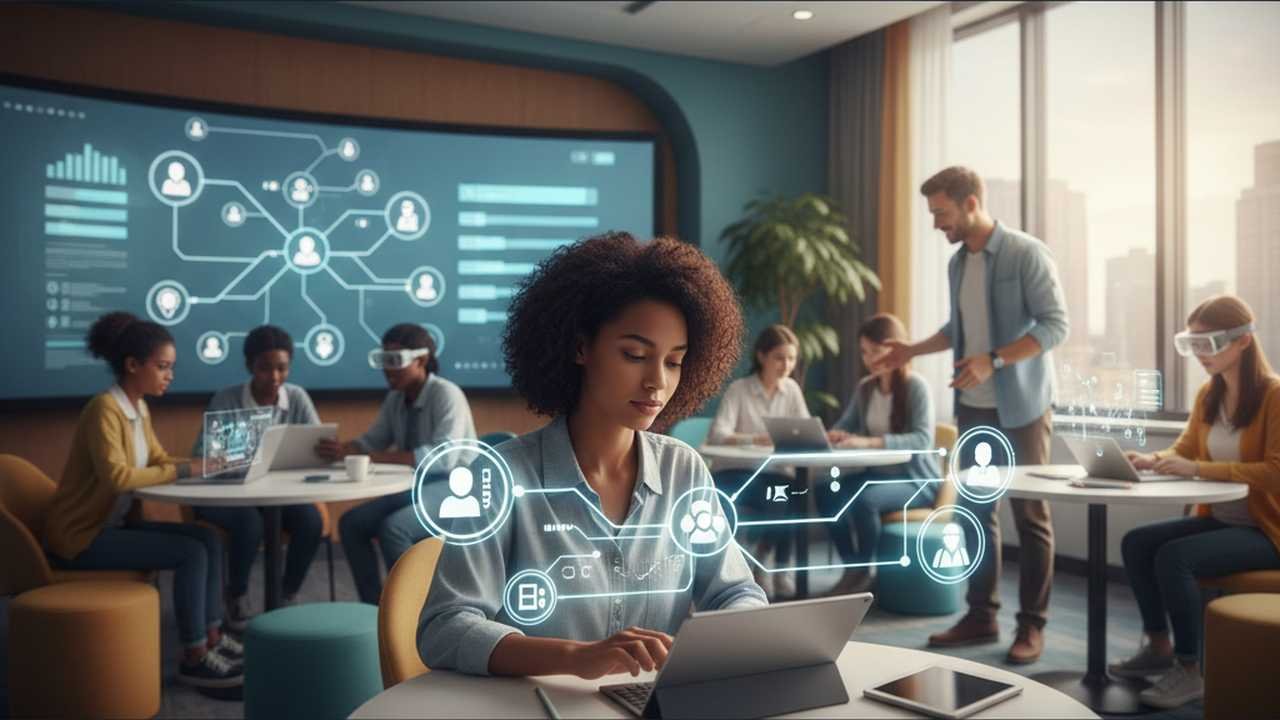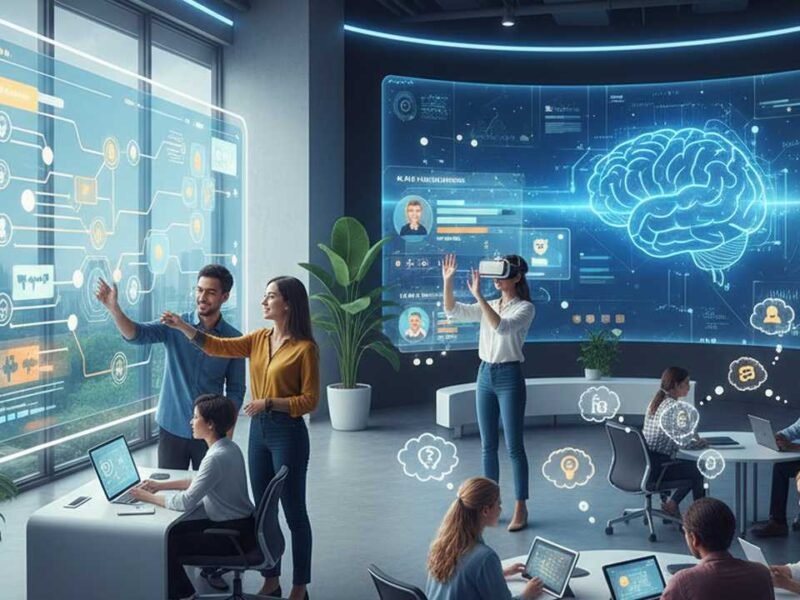The Urgent Shift Toward Personalized Education
Right now, as technology reshapes every corner of modern life, the education sector is racing to catch up. Students no longer want one-size-fits-all instruction – they crave personalized learning experiences that match their pace, style, and goals. The truth is that the future of education is being rewritten this very moment, and institutions that fail to adapt risk falling behind. Adaptive learning systems are not just tools; they are revolutionary engines designed to transform how knowledge is delivered and absorbed. Every day, schools and universities that hesitate are losing students to competitors who embrace this new wave of data-driven education. The most forward-thinking educational solutions company leaders know that personalization isn’t a luxury – it’s survival. This sense of urgency is pulsing through classrooms and digital campuses alike, pushing educators to rethink their entire approach. With adaptive platforms capable of analyzing student performance in real time and adjusting instruction instantly, the potential to close learning gaps has never been greater. The race is on, and those who hesitate risk missing the greatest educational transformation in decades.
What Makes Adaptive Learning So Powerful?
Imagine a classroom that breathes – one that listens, learns, and responds dynamically to every student’s needs. Adaptive learning technology does exactly that. Instead of forcing all learners through identical lessons, these systems use intelligent algorithms to adjust content based on each student’s behavior, progress, and preferences. The experience feels almost magical: as students struggle with complex topics, the platform immediately introduces easier examples or alternative explanations; when they excel, it offers advanced challenges to maintain engagement. This technology is backed by research, with studies showing that adaptive learning can boost retention rates by up to 50% and reduce time-to-mastery dramatically. The best educational solutions company providers are already deploying adaptive frameworks that seamlessly blend AI analytics with human expertise, creating learning ecosystems that are both data-rich and deeply human. It’s not science fiction – it’s happening now. And the institutions that hesitate to adopt these methods are already watching enrollment and satisfaction rates plummet. The urgency couldn’t be clearer: adaptive learning isn’t coming – it’s here, reshaping how students think, grow, and succeed.
The Science Behind Adaptive Learning Algorithms
At the heart of adaptive learning lies an intricate web of data and psychology, designed to understand the unique rhythm of every learner. These algorithms track every click, pause, and test result, translating raw numbers into meaningful patterns. They can detect when a student is losing focus, when they need reinforcement, and when they are ready for the next leap forward. It’s a living system that grows more intelligent with every interaction. For any forward-thinking educational solutions company, harnessing these algorithms is the key to unlocking long-term student success. Developers combine neural network modeling, behavioral analytics, and feedback loops to predict which content will resonate most effectively. Think of it as a private tutor powered by data, capable of guiding thousands of learners simultaneously without ever losing patience or precision. This deep scientific foundation is what makes adaptive learning credible, verifiable, and unstoppable. Institutions that rely on outdated teaching methods simply cannot compete with the measurable outcomes produced by adaptive technologies. The time to act is now, before the gap between traditional and intelligent learning becomes irreversibly wide.
Real-World Success Stories That Prove the Power of Adaptation
Across the globe, adaptive learning has already produced astonishing transformations. In one university partnership with a leading educational solutions company, dropout rates in introductory STEM courses plummeted by 40% after implementing adaptive coursework. Another case study from an online learning platform revealed that students who engaged with adaptive modules scored an average of two grade levels higher than peers in static programs. These are not isolated miracles – they are emerging trends that point toward a fundamental shift in education’s DNA. Teachers are reporting renewed enthusiasm in their classrooms, students are regaining confidence, and parents are witnessing tangible results. One teacher described how a shy student, once too intimidated to participate, began leading discussions after the system recognized her strengths and adjusted the difficulty of lessons accordingly. These human stories bring data to life. Behind every algorithm is a real learner, and behind every success story stands an institution that dared to innovate. The message is clear: delay is defeat. Schools that wait risk losing the brightest minds to those already thriving in adaptive environments.
How Adaptive Learning Fuels Institutional Growth
Beyond improving student outcomes, adaptive learning ignites institutional success in measurable ways. Colleges, universities, and training organizations that integrate adaptive systems experience higher engagement, better retention, and stronger reputational growth. Every success metric improves – from enrollment rates to alumni satisfaction – because adaptive learning offers something traditional instruction never could: personalized scalability. An educational solutions company with the right technological backbone empowers institutions to deliver consistent excellence across hundreds or thousands of learners simultaneously. This efficiency translates directly into financial sustainability, reduced instructor workload, and measurable ROI. Furthermore, institutions that adopt adaptive systems are perceived as innovative, attracting partnerships, grants, and high-value students who seek cutting-edge learning environments. As competition for learners intensifies, being first to adopt adaptive technologies is not merely advantageous – it’s vital. Those who hesitate will be left watching others dominate the digital learning space, capturing the attention and loyalty of an entire generation. The window of opportunity is closing fast, and the institutions that act today will own the future of education tomorrow.
Choosing the Right Educational Solutions Company
In a rapidly evolving digital ecosystem, choosing the right educational solutions company is as critical as the technology itself. Not all providers are created equal, and the difference between success and stagnation often lies in partnership quality. Institutions should seek providers with proven track records, verified case studies, and transparent data reporting. Licensing and security must be top priorities, ensuring student information is protected through encrypted systems and regulatory compliance. Responsive customer service is non-negotiable; educators need support that adapts as swiftly as the technology they use. Look for companies offering verified payouts for partnerships, scalable platforms, and continuous updates driven by real educational feedback. Trusted industry names like Edutopia frequently spotlight companies that set the benchmark for ethical innovation and reliability. This is not the time to gamble with untested vendors or makeshift software – this is a moment to align with experts who understand both technology and pedagogy. Choosing right today ensures that your learners and faculty won’t just keep pace – they’ll lead the revolution. Every day without an adaptive partner is a missed opportunity to transform learning outcomes.
Integrating Adaptive Learning Seamlessly into Curriculum
Introducing adaptive learning into existing academic structures can feel daunting, but the transition is far smoother than most imagine. Modern adaptive platforms are designed for seamless integration, aligning effortlessly with learning management systems, curriculum standards, and teaching frameworks. The best educational solutions company providers guide institutions through every step – from strategic planning to content migration – ensuring zero disruption to ongoing instruction. Teachers receive intuitive dashboards, allowing them to monitor individual progress and intervene with precision when needed. The result is a harmonious blend of technology and teaching artistry, where digital insights enhance rather than replace human expertise. Imagine an instructor who can instantly see which students are struggling and deploy targeted resources before frustration sets in. That’s the magic of adaptive learning at scale. Institutions that delay integration risk facing costly catch-up phases later, as competitors fine-tune their adaptive ecosystems and attract talent away. The time to merge innovation with instruction is now, while the market is still young and responsive. The seamlessness of integration today defines the strength of student engagement tomorrow.
Overcoming Resistance and Building a Culture of Adaptation
Despite the clear advantages, resistance to adaptive learning often stems from fear – fear of the unknown, fear of technology replacing teachers, fear of losing control. But these fears crumble under real experience. In every institution where adaptive systems have been adopted, educators report newfound empowerment, not displacement. The key is leadership that communicates vision and support. An educational solutions company with comprehensive training modules, transparent performance analytics, and continuous mentorship can turn skeptics into advocates. The culture of adaptation begins with understanding that technology is a partner, not a threat. When teachers see data validating their intuition – when they witness struggling students suddenly thriving – the transformation becomes personal. Every success story builds momentum, driving a sense of shared purpose that spreads through classrooms, departments, and entire campuses. The urgency to adapt is not just about staying competitive – it’s about staying relevant. The institutions that cultivate adaptability today are the ones that will lead tomorrow’s educational frontier, while those that cling to outdated traditions risk fading into obsolescence.
The Future of Adaptive Learning: What Happens Next?
The horizon of adaptive learning glows with unstoppable promise. Within the next few years, expect immersive AI tutors, real-time emotional engagement tracking, and hyper-personalized career pathways that evolve with each learner’s ambitions. The educational solutions company innovators at the forefront of this evolution are already prototyping systems that learn from billions of data points, predicting what each student will need weeks before they realize it themselves. Imagine a platform that not only teaches but anticipates learning styles, adjusting tone, pace, and delivery to maintain motivation. This is the future of education – a future that rewards institutions bold enough to lead today. Every delay widens the gap between leaders and laggards. Those who invest now will shape how millions learn in the coming decades, cementing their place as pioneers in educational transformation. The urgency could not be greater: adaptive learning is no longer an emerging concept – it’s the cornerstone of tomorrow’s education. The question isn’t whether to adapt, but whether you can afford not to.
Call to Action: Step Into the Future Now
The evidence is overwhelming, the tools are ready, and the moment is now. Every institution that acts decisively today will reap the rewards of personalization, engagement, and exponential growth. Partnering with a trusted educational solutions company ensures that your transition is guided by experts who understand both human learning and digital intelligence. Don’t wait for the competition to seize the advantage – move swiftly, strategically, and with purpose. The educational landscape is shifting beneath our feet, and hesitation means losing students, credibility, and future relevance. Embrace adaptive learning, empower your educators, and inspire your students with the confidence that their learning experience is truly their own. This is not just an upgrade; it’s a revolution. Make your move now and become the benchmark for innovation in modern education. The future is adaptive – and it’s waiting for you to claim it.

